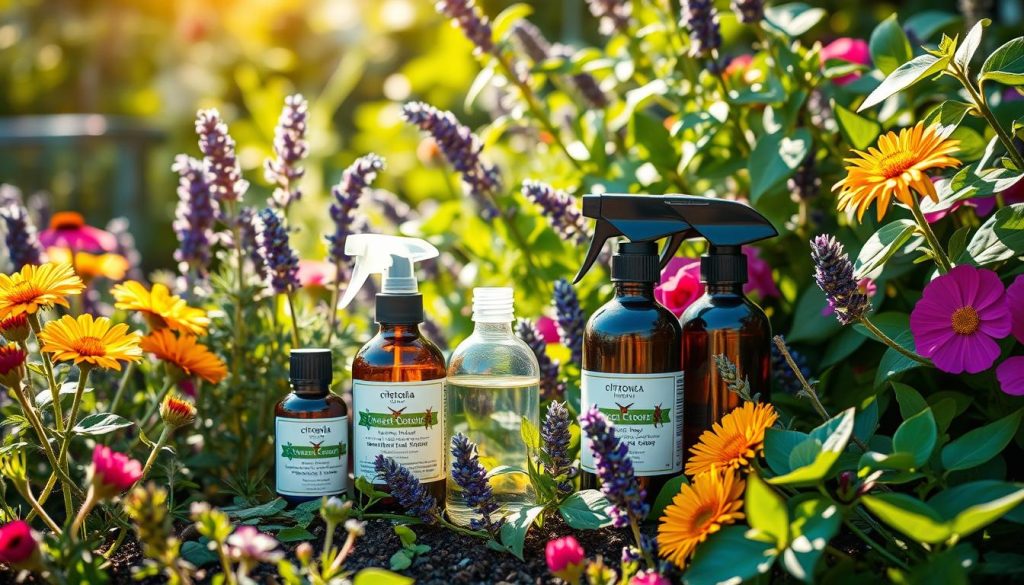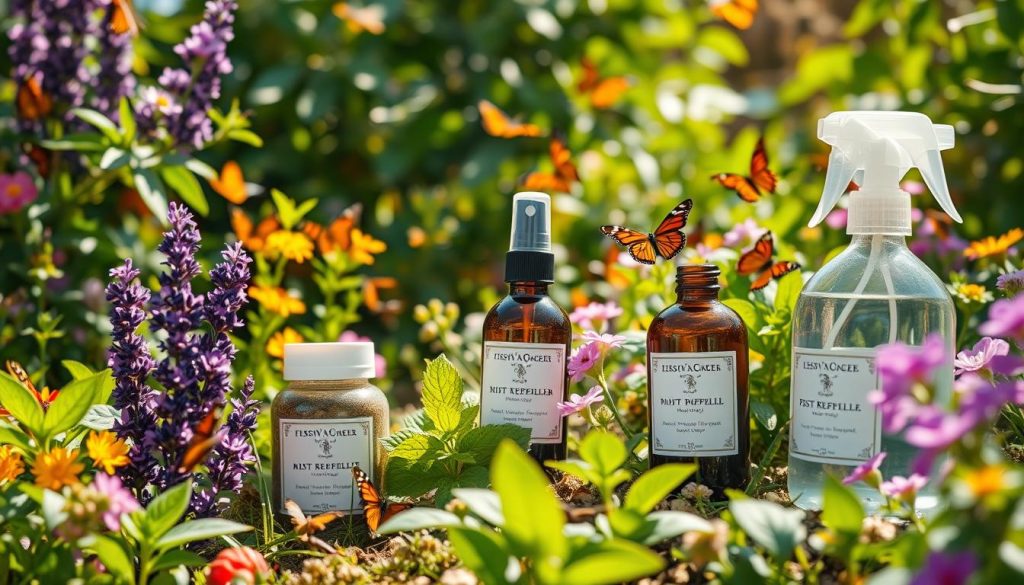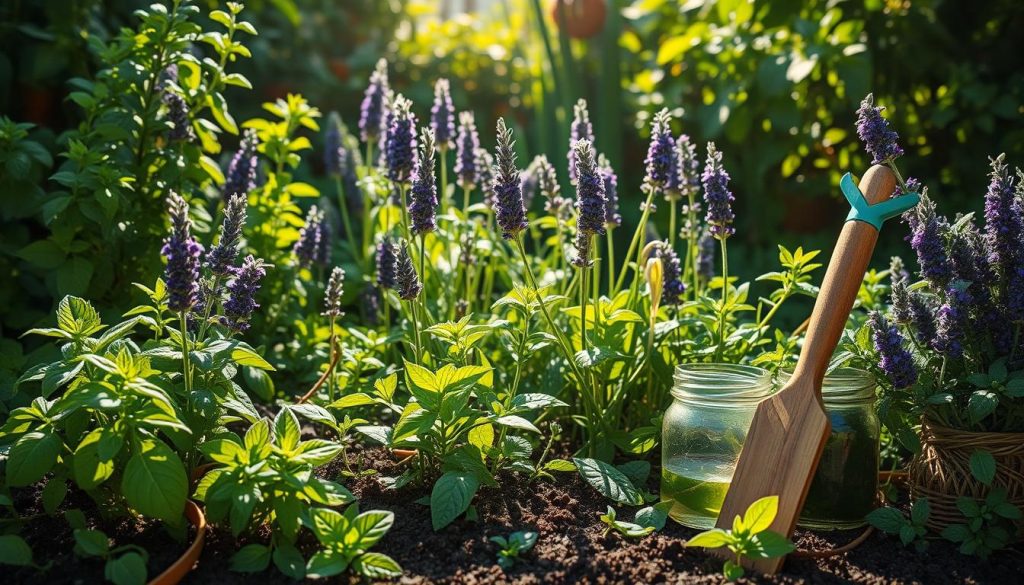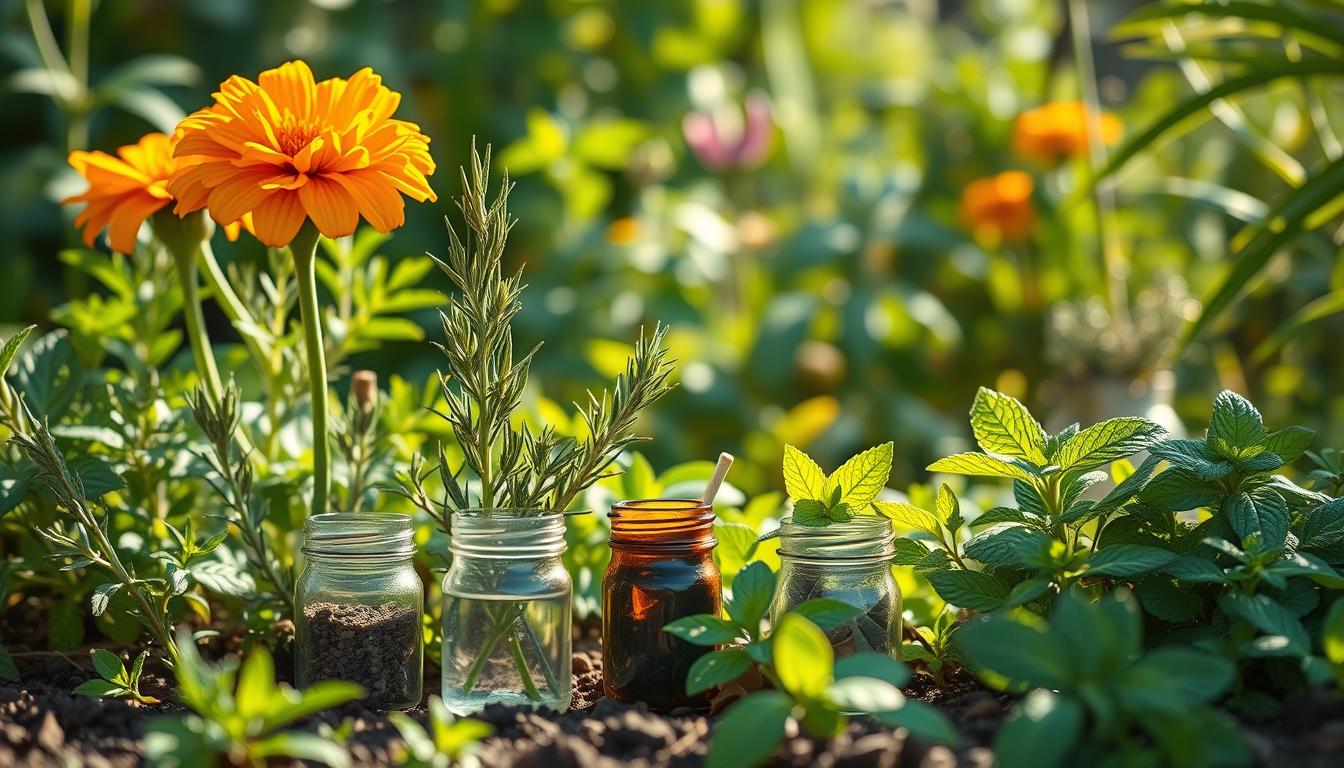I’m excited to share the benefits of natural pest repellents and organic pest control. Choosing these options helps us avoid harmful chemicals. It also supports eco-friendly living.
Using natural pest repellents keeps our homes and gardens safe without harming the environment. They help us create a balanced ecosystem. This is good for our families and pets.
I’m looking into different natural pest repellents. I’ll explore homemade recipes and store-bought options. By using natural pest repellents, we can live healthier and more sustainably.
What Are Natural Pest Repellents?

Natural pest repellents are a safer choice than chemical products. They use natural ingredients like essential oils and herbs. These are gentle on the environment and our health. By using them, we can avoid harmful chemicals and make our homes healthier.
Ingredients like citronella, lemongrass, and peppermint are common in these repellents. They naturally keep pests away. Plus, they are biodegradable, which means they don’t harm the environment or wildlife.
Definition and Benefits
Natural pest repellents use natural ingredients to keep pests away. They have many benefits, like reducing pollution and improving health. They also make our homes safer and promote sustainability.
Common Ingredients
Some common ingredients in natural pest repellents include:
- Citronella
- Lemongrass
- Peppermint
- Geraniol
- Lavender
Why Choose Natural Over Chemical?
Choosing natural pest repellents is better for our health and the environment. They are safer than chemical products, which can harm us and the planet. By using eco-friendly solutions, we help create a healthier and more sustainable world.
| Ingredient | Benefits |
|---|---|
| Citronella | Natural insect repellent, reduces anxiety and stress |
| Lemongrass | Natural insect repellent, anti-inflammatory properties |
| Peppermint | Natural insect repellent, improves mental focus and digestion |
My Journey to Using Natural Pest Repellents

I remember the day I chose natural pest repellents. I was fed up with chemical products that harmed the environment and our health. I started looking for alternatives and found DIY pest repellents and natural bug deterrents.
Exploring natural pest control showed me its many benefits. These solutions are good for the planet, save money, and are simple to make. I tried different recipes, using essential oils, herbs, and spices to keep bugs away.
Discovering Alternatives
Using natural pest repellents offers many options. You can choose from citronella candles to lemongrass sprays. Mixing these methods helped me keep pests out of my home and garden.
My First Experience
My first try with natural pest repellents was a hit. I made a lemon juice and water spray to keep ants away. It worked great, and I felt good about choosing a greener lifestyle.
Success Stories
Since then, I’ve tried many DIY pest repellents and natural bug deterrents. They’ve been effective against mosquitoes and rodents. I hope my story encourages others to try natural pest repellents and see the benefits for themselves.
How to Make Your Own Natural Pest Repellents

Making your own natural pest repellents is fun and effective. It’s a great way to use plant-based pest control and safe pest management. With just a few simple ingredients, you can create repellents without harsh chemicals or toxins.
Simple Recipes to Try
Here are a few easy recipes to get you started:
- Mix equal parts water and white vinegar in a spray bottle to create a natural insect repellent.
- Combine 10 drops of peppermint essential oil with 1 cup of water to create a spray that repels ants and spiders.
- Blend 1/2 cup of lemon juice with 1 cup of water to create a spray that repels aphids and other garden pests.
Essential Oils That Work
Certain essential oils, like lemongrass and citronella, naturally repel pests. You can use them alone or mix them with other ingredients for effective repellents.
| Essential Oil | Pest-Repelling Properties |
|---|---|
| Lemongrass | Repels mosquitoes and ants |
| Citronella | Repels mosquitoes and other flying insects |
Tips for Effective Application
To make your natural pest repellents work best, apply them regularly and in the right spots. Spray repellents around your home or garden’s edges. Reapply after heavy rain or every few days.
Natural Pest Repellent for the Garden
Exploring natural pest repellents has really caught my interest. It’s amazing how many options there are for gardeners. Using homemade pest repellents helps create a balanced garden ecosystem. This approach has greatly reduced pests and boosted beneficial insects in my garden.
First, we need to know which pests are common garden enemies. Aphids, whiteflies, and spider mites are big troublemakers. Neem oil, garlic spray, or hot pepper spray can keep them away. For instance, marigolds with tomatoes fight nematodes, and basil keeps aphids off veggies.
Targeted Solutions for Common Pests
- Aphids: Use neem oil or insecticidal soap to control infestations
- Whiteflies: Spray garlic or hot pepper solution to repel them
- Spider mites: Use rosemary or lavender essential oil to deter them
Companion Planting Techniques
Companion planting is a smart way to grow plants together. It boosts growth, flavor, or pest resistance. For example, nasturtiums with cabbage repel aphids, and radishes with cucumbers keep away cucumber beetles. By combining natural pest repellents with companion planting, we can build a healthy garden ecosystem. This approach reduces the need for harmful chemicals.
| Plant | Pest Repelled | Benefit |
|---|---|---|
| Marigolds | Nematodes | Repels nematodes, attracts beneficial insects |
| Basil | Aphids | Repels aphids, improves flavor of nearby plants |
| Radishes | Cucumber beetles | Repels cucumber beetles, improves soil health |
Using Natural Pest Repellents Indoors
I choose organic pest control for my home. It’s safe for my family and pets. I use scented sprays and potpourri made from natural ingredients like essential oils and herbs.
Using natural pest repellents indoors has many benefits. It reduces chemical exposure and makes my home healthier. I use a mix of methods to keep pests away, including:
- Essential oils like lavender and peppermint to repel insects
- Herbs like basil and mint to keep pests away
- DIY scented sprays made from natural ingredients
Safe Solutions for Home
To keep my home pest-free, I also protect my pets and kids. I use non-toxic insect repellents that are safe for them. I keep these repellents out of their reach.
Scented Sprays and Potpourri
I make my own scented sprays and potpourri. I use natural ingredients like essential oils and herbs. This keeps pests away and makes my home welcoming.
Keeping Pets and Kids Safe
When using natural pest repellents, I take extra care. I keep pets and kids away from areas where repellents are used. I also make sure they don’t ingest any of the ingredients.
| Method | Benefits | Precautions |
|---|---|---|
| Essential oils | Repel insects, create a pleasant atmosphere | Keep out of reach of children and pets |
| Herbs | Keep pests away, add a natural fragrance | Ensure they are not ingested by pets or kids |
| DIY scented sprays | Cost-effective, easy to make | Use natural ingredients, avoid harsh chemicals |
My Favorite Natural Pest Repellent Products
I’ve found some great natural pest repellents for my home and garden. These products are eco-friendly and safe for my family and the planet. They’ve helped me cut down on chemical use.
Brands like Ecover and Seventh Generation are among my favorites. They offer effective, gentle products for the environment.
Brand Recommendations
- Ecover: Offers a range of natural pest repellent products, including sprays and traps.
- Seventh Generation: Provides eco-friendly pest solutions, including laundry detergents and cleaning products.
Comparing Effectiveness
When picking natural pest repellents, consider a few things. Look at the pest type, area size, and infestation level. This way, you choose the best eco-friendly solution for your situation.
Common Mistakes to Avoid
Discovering natural pest repellents is exciting. But, it’s crucial to avoid common mistakes for them to work well and safely. Don’t overuse these products. Too much can harm the environment.
Also, ignore weather, moisture, and pest types at your own risk. These factors affect how well your natural pest control works.
Always test for allergies before using natural pest repellents. This is especially true if you have sensitive skin or breathing problems. Some essential oils and natural ingredients can irritate certain people.
By avoiding these mistakes, you’ll get the most out of natural bug deterrents and plant-based pest control. With a bit of care, you can keep your space pest-free and eco-friendly. Happy natural pest repelling!

